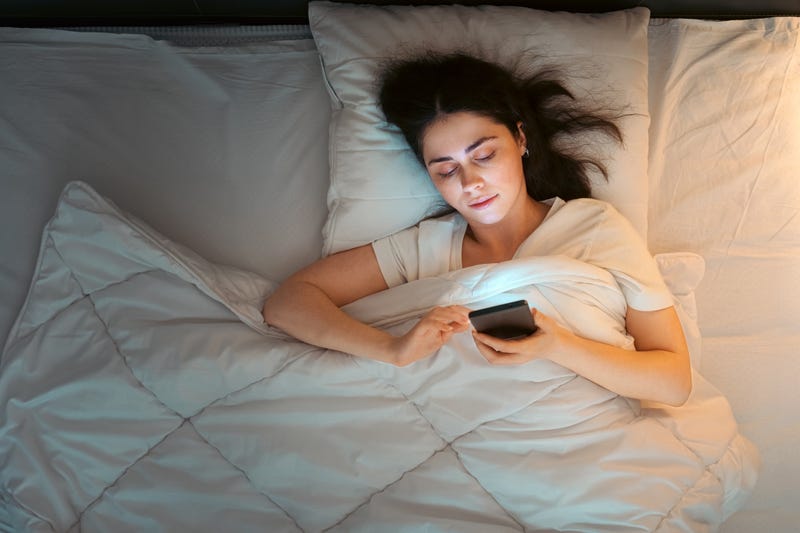
As we get ready to spring our clocks on hour ahead early Sunday morning, a few tips from Mayo Clinic to get better sleep during a weekend that can cause some deep disruptions in your circadian rhythm. While it may seem that "just one hour" shouldn't be that big of a deal, it actually has some serious effects on the body.
Dr. Vivend Somers says a big one thing that can help is minimizing stimulation in the evening.
"Minimize alcohol, minimize exercise, minimize lights," says Dr. Somers. "Minimize external inputs before about two hours or so before bedtime."
That would include screen activity which is a major issue for those that drag phones, tablets or televisions into the bedroom.
Somers also says it's best to keep your bedroom as dark as possible. Somers says absolute darkness in the bedroom is essential for the body to wind down into sleep mode.
"The bedroom is for sex and sleep," he says. "It's not for spreadsheets."
Somers also recommends avoiding bright light and exercise in the evening if possible.
When does daylight saving time start?
Daylight saving time begins Sunday at 2 a.m., an hour of sleep vanishing in most of the U.S. The ritual will reverse on Nov. 2 when clocks “fall back” as daylight saving time ends.
Hawaii and most of Arizona don’t make the spring switch, sticking to standard time year-round along with Puerto Rico, American Samoa, Guam and the U.S. Virgin Islands. Worldwide, dozens of countries also observe daylight saving time, starting and ending at different dates.
Some people try to prepare for daylight saving time’s sleep jolt by going to bed a little earlier two or three nights ahead. With a third of American adults already not getting the recommended seven hours of nightly shuteye, catching up can be difficult.
What happens to your brain when it’s lighter later?
The brain has a master clock that is set by exposure to sunlight and darkness. This circadian rhythm is a roughly 24-hour cycle that determines when we become sleepy and when we’re more alert. The patterns change with age, one reason that early-to-rise youngsters evolve into hard-to-wake teens.
Morning light resets the rhythm. By evening, levels of a hormone called melatonin begin to surge, triggering drowsiness. Too much light in the evening — that extra hour from daylight saving time — delays that surge and the cycle gets out of sync.
Sleep deprivation is linked to heart disease, cognitive decline, obesity and numerous other problems. And that circadian clock affects more than sleep, also influencing things like heart rate, blood pressure, stress hormones and metabolism.
How does the time change affect your health?
Fatal car crashes temporarily jump the first few days after the spring time change, according to a study of U.S. traffic fatalities. The risk was highest in the morning, and researchers attributed it to sleep deprivation.
Then there’s the cardiac connection. The American Heart Association points to studies that suggest an uptick in heart attacks on the Monday after daylight saving time begins, and in strokes for two days afterward.
Doctors already know that heart attacks, especially severe ones, are a bit more common on Mondays generally — and in the morning, when blood is more clot-prone.
Researchers don’t know why the time change would add to that Monday connection but it’s possible the abrupt circadian disruption exacerbates factors such as high blood pressure in people already at risk.
How to prepare for daylight saving time
Gradually shift bedtimes about 15 or 20 minutes earlier for several nights before the time change, and rise earlier the next morning, too. Go outside for early morning sunshine that first week of daylight saving time, another way to help reset your body’s internal clock. Moving up daily routines, like dinner time or when you exercise, also may help cue your body to start adapting, sleep experts advise.
Afternoon naps and caffeine as well as evening light from phones and other electronic devices can make adjusting to an earlier bedtime even harder.
Will the U.S. ever eliminate the time change?
Every year there’s talk about ending the time change. In December, then-President-elect Donald Trump promised to eliminate daylight saving time. For the last several years, a bipartisan bill named the Sunshine Protection Act to make daylight saving time permanent has stalled in Congress; it has been reintroduced this year.
But that’s the opposite of what some health groups recommend. The American Medical Association and American Academy of Sleep Medicine agree it’s time to do away with time switches but say sticking with standard time year-round aligns better with the sun — and human biology — for more consistent sleep.
The Associated Press contributed to this story.
